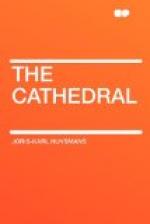And then, as in the swift change of magic-lantern slides, this savage scene, this worn-out symbol of a splendid and subtle liturgy, stammered out in a hoarse voice, disappeared, giving way to the solemn array of Levites and priests marching in procession under the guidance of Aaron, resplendent in his turban with the crown of gold above it, in his purple robe, on its hem the open pomegranates of scarlet and blue, with tinkling bells of gold; and he wore the linen ephod, girt with a girdle, blue and purple and scarlet, and kept in its place by shoulder-pieces fastened with onyx stones, his breastplate in a blaze, flashing sparks that lighted up as he moved in the twelve gems of the breastplate.
Again the scene changed. He beheld an amazing palace; under the shade of its domes of giddy height, tropical trees and flowers were planted by tepid pools; monkeys sported there, hanging in bunches to the boughs, while long-drawn, insinuating melodies were scraped on stringed instruments, and the rattle of tambourines made the eyed plumes quiver in the peacocks’ outspread tails.
In this strange hot-bed, filled with clumps of flowers and of women, this immense harem where his seven hundred princesses and his three hundred concubines disported themselves, Solomon watched the whirl of dances, gazed at the living hedge of women, seen against the background of gold-plated walls, their bodies clothed only in the transparent veil of vapour rising from resins burning on tripods.
He appeared as a typical Eastern monarch, a sort of Khalif or Sultan, or fairy-tale Rajah—the prodigious king at once polygamous, unbridled, insatiable by luxury, and learned, artistic, peace-loving, the wisest among men. In advance of the ideas of his time, he was the great builder in Israel, and the commerce of the country was of his making. He left such a reputation for wisdom and justice that he came at last to be regarded as an enchanter and wizard. Even Josephus tells us that he wrote a book of Magic, of incantations for laying evil spirits; in the Middle Ages he was said to have owned a magic ring, charms, forms of evocation, secrets for exorcism; and in all these legends the image of the king becomes confused.
And he would remain to this day a figure out of the Thousand and One Nights, were it not that in the decline of his glory we see him as a grandiose image of the mournfulness of life, the vanity of joy, the nothingness of man.
His old age was melancholy. Exhausted and governed by women, he denied God and sacrificed to idols. We discern in him wide gaps, vast clearings in the soul. Weary of everything, sick of enjoyment, and drunken with sin, he wrote some admirable reflections and anticipated the blackest pessimism of our day, summing up the misery of him who endures the condemnation of living, in phrases that are its final expression. What distress is that of the Preacher: All the days of man are sorrow, and his travail grief; better is the day of death than the day of birth; all is vanity and vexation of spirit.




